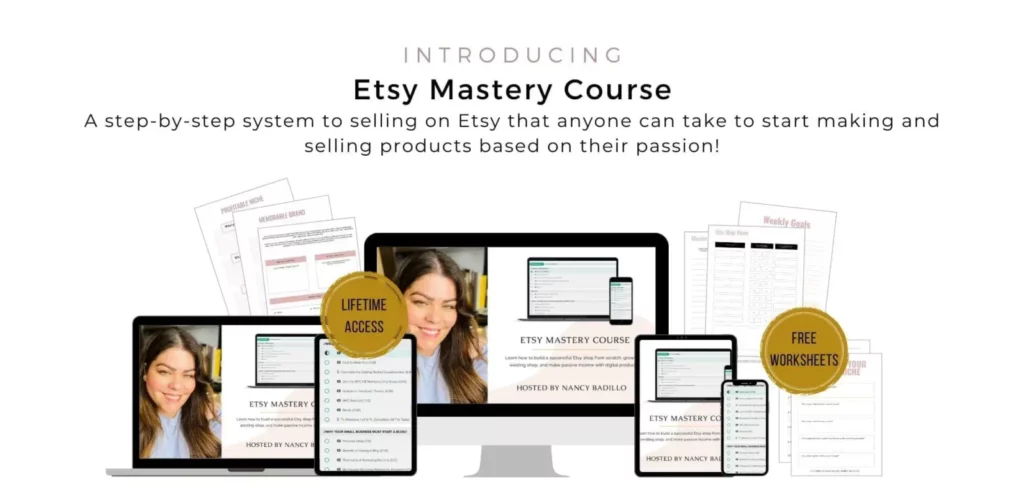If you’re an entrepreneur looking to start an online business, you may have heard the term “dropshipping” thrown around. But what exactly is dropshipping? In a nutshell, it’s a business model that allows you to sell products without having to store, handle, or ship inventory yourself. Instead, you partner with a supplier who stocks the products and ships them directly to your customers.
This means you can run an online store without the overhead costs of purchasing and storing inventory. Dropshipping has become increasingly popular in recent years, thanks to the rise of e-commerce and platforms like Shopify, WooCommerce, and Amazon. However, it’s not a get-rich-quick scheme – like any business, it takes hard work, dedication, and a solid understanding of marketing and customer service. In this article, we’ll dive deeper into what dropshipping is, how it works, and what you need to know to get started.

This blog post is all about what is dropshipping.
Home > Ecommerce Tips > What Is Dropshipping
DISCLOSURE: This is a sponsored post. Through my links, I may receive a commission if you decide to make purchases at no cost for yourself! Check out our disclaimer for more info on how it works.
Table of contents
- How Does Dropshipping Work?
- Benefits of Dropshipping
- Drawbacks of Dropshipping
- Dropshipping vs Traditional Retail
- Finding a Profitable Niche for Dropshipping
- How to Find Dropshipping Suppliers
- Setting Up Your Dropshipping Website
- Managing Your Dropshipping Business
- Dropshipping Success Stories
- Conclusion: What Is Dropshipping
- Ready To Start An Etsy Business?
- New On The Blog
- Additional helpful blogs tools, legal tips, and resources
How Does Dropshipping Work?
Dropshipping is a business model that involves three key players: the retailer, the supplier, and the customer. The retailer is the person who sells the products, but they don’t keep any inventory on-hand. Instead, they partner with a supplier who stocks the products and handles the shipping process. When a customer places an order on the retailer’s website, the retailer forwards the order to the supplier, who then fulfills the order and ships it directly to the customer.
One of the biggest advantages of dropshipping is that it eliminates the need for the retailer to purchase and store inventory. This means there’s no need to rent warehouse space, buy packaging materials, or hire staff to handle shipping. It also means the retailer can offer a wider range of products without having to invest in inventory upfront.
However, dropshipping also has some drawbacks. One of the biggest challenges is finding reliable suppliers who can consistently deliver high-quality products in a timely manner. Another challenge is that the retailer has less control over the customer experience, since they’re relying on the supplier to handle the shipping and fulfillment process.
Benefits of Dropshipping
Despite its drawbacks, dropshipping offers a number of benefits for entrepreneurs looking to start an online business. Here are a few of the most significant advantages:
Low Overhead Costs
One of the biggest advantages of dropshipping is that it allows you to start an online business with minimal overhead costs. Since you don’t need to purchase inventory upfront, you can avoid the costs of renting warehouse space, buying packaging materials, and paying for staff to handle shipping. This makes it an ideal option for entrepreneurs who are just starting out and don’t have a lot of capital to invest.
Flexible Location
Another advantage of dropshipping is that it allows you to run your business from anywhere in the world. As long as you have an internet connection, you can manage your website, communicate with suppliers, and process orders from anywhere. This means you can work from home, travel while you work, or even run your business as a side hustle while you maintain a full-time job.
Wide Range of Products
Since you don’t need to purchase inventory upfront, dropshipping allows you to offer a wide range of products without having to invest a lot of money. This means you can test different products and niches without committing to a large inventory order. It also means you can quickly add new products to your website as trends and customer preferences change.
Drawbacks of Dropshipping
While dropshipping offers a number of benefits, it’s not without its drawbacks. Here are a few of the most significant challenges:
Supplier Dependence
One of the biggest challenges of dropshipping is that it requires you to rely on your suppliers to handle the shipping and fulfillment process. This means you have less control over the customer experience and may run into issues if your supplier is unreliable or doesn’t deliver high-quality products. In some cases, suppliers may also run out of stock or discontinue products without warning, which can be frustrating for retailers.
Lower Profit Margins
Since dropshipping doesn’t require you to purchase inventory upfront, it’s generally associated with lower profit margins than traditional retail. This is because you’re paying for the cost of the product and shipping, as well as the supplier’s markup. While you can still make a profit with dropshipping, it’s important to carefully calculate your costs and pricing to ensure you’re making a sustainable profit.
Increased Competition
Dropshipping has become increasingly popular in recent years, which means there’s more competition than ever before. This can make it difficult to stand out from the crowd and attract customers to your website. It also means you may need to invest more time and resources into marketing and advertising to drive traffic to your site.
Dropshipping vs Traditional Retail
While dropshipping and traditional retail both involve selling products to customers, there are some key differences between the two models. Here are a few of the most significant differences:
Inventory Management
In traditional retail, the retailer purchases inventory upfront and stores it in a warehouse or storefront. This means they have more control over the inventory and can quickly fulfill orders without relying on a third-party supplier. In dropshipping, the retailer doesn’t purchase inventory upfront and relies on a supplier to handle the shipping and fulfillment process.
Overhead Costs
Traditional retail generally involves higher overhead costs than dropshipping, since the retailer needs to purchase and store inventory upfront. This means they need to pay for warehouse space, packaging materials, and staff to handle shipping. In dropshipping, the retailer doesn’t need to purchase inventory upfront and can avoid these costs.
Profit Margins
Traditional retail generally offers higher profit margins than dropshipping, since the retailer is purchasing inventory at a wholesale price and marking it up for retail. In dropshipping, the retailer is paying for the cost of the product, shipping, and the supplier’s markup, which can lead to lower profit margins.
Finding a Profitable Niche for Dropshipping
One of the keys to success with dropshipping is finding a profitable niche. A niche is a specific product category or market segment that you can target with your website. Here are a few tips for finding a profitable niche:
Conduct Market Research
Before you start your dropshipping business, it’s important to conduct market research to identify gaps in the market and find products that are in high demand. You can use tools like Google Trends, Amazon Bestsellers, and social media platforms to identify trends and popular products.
Identify Your Target Audience
Once you’ve identified a potential niche, it’s important to understand your target audience. Who are they? What are their interests and preferences? What problems are they trying to solve? This information can help you tailor your product offerings and marketing messaging to appeal to your target audience.
Evaluate Profit Margins
When evaluating potential niches, it’s important to consider your profit margins. Look for products that offer a healthy markup and don’t require a lot of upfront investment. You should also consider the shipping costs and any other fees associated with the product.
How to Find Dropshipping Suppliers
Once you’ve identified a profitable niche, the next step is to find a reliable dropshipping supplier. Here are a few tips for finding a supplier:
Use a Dropshipping Platform
One of the easiest ways to find a dropshipping supplier is to use a platform like Shopify or AliExpress. These platforms have a wide range of suppliers and products to choose from, and they handle the payment and shipping process for you.
Contact Manufacturers Directly
Another option is to contact manufacturers directly and inquire about their dropshipping programs. This can be more time-consuming, but it allows you to establish a direct relationship with the supplier and potentially negotiate better pricing.
Attend Trade Shows
Attending trade shows and industry events can also be a great way to connect with potential suppliers and learn more about the products you’re interested in.
Setting Up Your Dropshipping Website
Once you’ve identified a profitable niche and found a reliable supplier, the next step is to set up your dropshipping website. Here are a few tips to help you get started:
Choose a Platform
There are a number of platforms to choose from when setting up your dropshipping website, including Shopify, WooCommerce, and Magento. Choose a platform that fits your budget and technical expertise.
Select a Theme
Choose a theme that fits your brand and product offerings. Look for a theme that is easy to navigate and optimized for conversions.
Optimize for SEO
Optimize your website for search engines by including relevant keywords in your product descriptions and meta tags. This can help you rank higher in search engine results and attract more traffic to your site.
Managing Your Dropshipping Business
Once your dropshipping business is up and running, it’s important to manage it effectively to ensure its success. Here are a few tips to help you manage your business:
Monitor Your Inventory
Keep a close eye on your inventory levels to ensure you don’t run out of stock. You should also regularly review your supplier’s inventory levels to ensure they can fulfill your orders.
Provide Excellent Customer Service
Since you’re relying on your supplier to handle the shipping and fulfillment process, it’s important to provide excellent customer service to ensure a positive customer experience. Respond to customer inquiries promptly and handle any issues that arise quickly and professionally.
Analyze Your Metrics
Regularly analyze your website metrics, including traffic, conversions, and revenue, to identify areas for improvement and optimize your marketing strategy.
Dropshipping Success Stories
Dropshipping has produced a number of successful entrepreneurs over the years. Here are a few inspiring success stories:
Oberlo
Oberlo is a dropshipping app that was acquired by Shopify in 2017. The company was founded by Tomas Slimas and Andrew Roach in 2015 and has since helped thousands of entrepreneurs start successful dropshipping businesses.
Zappos
Zappos is a popular online shoe retailer that started as a dropshipping business. Founder Nick Swinmurn started the company in 1999 by dropshipping shoes from suppliers and eventually grew it into a multi-million dollar business.
Wayfair
Wayfair is an online home goods retailer that was founded in 2002 by Niraj Shah and Steve Conine. The company started as a dropshipping business and eventually grew to become one of the largest online retailers in the world.
Conclusion: What Is Dropshipping
Dropshipping is a powerful business model that has helped thousands of entrepreneurs start successful online businesses. While it has its challenges, it offers a number of benefits, including low overhead costs, flexible location, and a wide range of product offerings. By carefully selecting a profitable niche, finding a reliable supplier, and setting up your website effectively, you can create a successful dropshipping business that allows you to live life on your own terms.
Ready To Start An Etsy Business?
If you’re considering starting your own Etsy store but unsure about which products to offer, my signature course, the Etsy Mastery Course, is your ultimate guide. Learn how to start, manage, and scale your Etsy business to a full-time income.

New On The Blog
- Understanding MAP Pricing: Strategies for Retail Success
- Top 10 Best Ecommerce Sites for Your Online Store Success
- Learn How to Make Candles: An Easy Guide for Beginners
- How Does Dropshipping Work?
- Free Online Pay Stub Generator
- PayPal Fees Guides – How Much Does PayPal Charge?
Additional helpful blogs tools, legal tips, and resources
Affordable Trademark registration package to protect your business – Learn more!
Get started now & see why it's the best all-in-one marketing platform. Try it for 30 days!
Use this AI plagiarism checker to ensure your content is free from copyright issues and originality concerns – Learn more!
Elevate your brand with these beautiful website and social media templates! See them here!
Beat your competition and create better content with these easy-to-use tools and strategies. Learn more!
If your business or brand has a website, you need these agreements (no seriously, it’s not an option) Learn more!
Unlock the Power of Automation with ManyChat: Transform Your Workflow Today! Learn more!
Explore Our Premade Content Collections: Discover a Range of Videos and Stock Images to Make Content Creation Effortless and Inspiring! Learn more!
Use this SEO Tool to make sure your blog rank on the first page of Google + blow up your traffic! Learn more!
Launch your Email List with ConvertKit, the Ultimate Email Provider loaded with all the bells and whistles! Start Your Free Trial!
My number one tool to explode your blog traffic! Check it out here!
CapCut is an all-in-one creative platform powered by AI that enables video editing and image design on browsers, Windows, Mac, Android, and iOS. Learn more!
Unlock the Secrets to Building a Thriving Online Business! Subscribe to my YouTube channel for access to over 1,000 free videos packed with expert insights and actionable strategies to help you start, manage, and elevate your business. Subscribe here!
A great all-in-one business platform for hosting your course, sales page, checkout page, and much more. Learn more!
The best web hosting company for your website. Learn more!
More tools to grow your online business:
TubeBuddy to grow your YouTube channel, and this is another great tool for YouTube SEO! Learn more!
Learn how I make passive income $3,000 per month by reviewing products I own and love. Learn more!
Whether you’re a seasoned marketer or just starting out, our social marketing membership offers everything you need to stay ahead of the curve and make an impact. Ready to take your social media presence to the next level? Join us today!
All the essentials to kickstart your digital marketing business from scratch! 23 guides for $23 dollars! Check out the Ultimate Digital Vault Marketing here!
The 4-Step Framework for A Profitable Etsy Shop! Reserve Your FREE Seat here!
65 Ready-to-use email templates to boost your business - check them out!
4,806 + pieces of social media to help you save time, grow your brand awareness, and make money online! See the list!
Start, grow, and scale your Etsy business to a full-time income with our signature course! Check it out here!




+ show Comments
- Hide Comments
add a comment